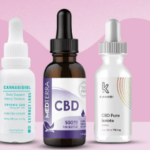If you’re new to the world of wellness, you may have heard the buzz surrounding CBD. It’s everywhere these days – from skincare products to pet treats – and for good reason. But what does CBD mean? And how can it benefit your health? In this beginner’s guide, we’ll break down everything you need to know about cannabidiol and its various forms, uses, and potential pros and cons. Get ready to discover why so many people are turning to CBD as a natural way to enhance their well-being!
What does cbd mean?
CBD, short for cannabidiol, is a natural compound found in the cannabis plant. Unlike its cousin THC, which is known for its psychoactive effects on the mind and body, CBD does not produce a “high” sensation. Instead, it interacts with receptors in our endocannabinoid system (ECS), which plays an important role in regulating various bodily functions such as sleep, appetite, mood and pain.
CBD can be extracted from both marijuana and hemp plants. While both contain CBD and THC compounds, hemp-derived CBD products are legally required to have less than 0.3% THC content by law. This makes them more widely available since they don’t produce any psychoactive effects.
CBD comes in different forms including oil tinctures, capsules or gummies that can be ingested orally; topical creams or balms that can be applied directly to the skin; and even vapes for inhalation.
Many people turn to CBD as a natural alternative to traditional medication because of its potential benefits such as reducing anxiety and stress levels or easing chronic pain without causing harmful side effects like opioids do. But it’s important to note that research into these claims is still ongoing and there are no guarantees about how effective CBD may be for everyone’s unique needs.
The Different Types of CBD
CBD is a versatile compound with various types, each having unique characteristics and benefits. The three most common types of CBD are full-spectrum, broad-spectrum, and isolate.
Full-spectrum CBD contains all the naturally occurring compounds found in the cannabis plant, including THC (tetrahydrocannabinol). This type of CBD offers the most potential benefits due to the synergistic effect known as the “entourage effect.” However, it may cause psychoactive effects in some individuals due to its THC content.
Broad-spectrum CBD also contains all natural compounds found in hemp plants except for THC. This type of CBD offers many potential benefits without any psychoactive effects.
Isolate is pure CBD extracted from hemp plants and does not contain any other cannabinoids or terpenes. It’s best suited for people who want to avoid ingesting even trace amounts of THC or other cannabinoids.
Each type has its advantages and disadvantages depending on individual preferences and needs. Ultimately it’s important to choose a reputable source when purchasing any form of cannabidiol product.
Pros and Cons of CBD
CBD has been touted as a miracle cure for a variety of ailments, but like any supplement or medication, it has its pros and cons. Here are some things to consider before deciding whether CBD is right for you.
Pros:
- Pain relief: CBD is known to alleviate pain from conditions such as arthritis, multiple sclerosis, and even cancer.
- Anxiety relief: Studies have shown that CBD can reduce anxiety symptoms in people with social anxiety disorder and post-traumatic stress disorder (PTSD).
- Neuroprotective properties: CBD may help protect the brain from damage caused by neurological disorders such as Parkinson’s disease or stroke.
- Fewer side effects than traditional medications: Many people prefer using natural remedies like CBD because they typically cause fewer side effects than prescription drugs.
Cons:
- Lack of regulation: Since the FDA does not regulate most CBD products, there is no guarantee that what you’re buying contains what it claims to contain.
- Potential drug interactions: If you’re taking other medications, especially blood thinners or anti-seizure drugs, be sure to talk to your doctor before trying CBD.
- Side effects in some people: While most people don’t experience any negative side effects from taking CBD, some report feeling tiredness or changes in appetite.
While there are potential risks associated with using CBD products, many find them outweighed by the benefits they offer. As always though consult your doctor before adding anything new into your diet!
What are the Different Uses of CBD?
CBD has become increasingly popular due to its potential health benefits. From reducing anxiety and depression to helping with chronic pain, it is used for a variety of purposes. Here are some of the different uses of CBD:
- Pain Relief: CBD oil can be used as a natural alternative to prescription painkillers for people who suffer from chronic pain conditions such as arthritis or multiple sclerosis.
- Anxiety and Depression: CBD may help alleviate symptoms of anxiety and depression by interacting with serotonin receptors in the brain.
- Skin Conditions: People suffering from skin conditions like eczema or psoriasis can benefit from using topical CBD products, which have anti-inflammatory properties that can soothe irritated skin.
- Seizures: Studies show that CBD may reduce the frequency and severity of seizures in people with epilepsy.
- Cancer Symptoms: Some cancer patients use CBD to alleviate symptoms related to chemotherapy, such as nausea and vomiting.
While research is still ongoing on the efficacy of using CBD for various health issues, many individuals have reported positive results when incorporating it into their wellness routines.
How to Take CBD
Taking CBD can be done in a variety of ways, depending on your preference and needs. One popular method is by using CBD oil drops under the tongue. This allows for quick absorption into the bloodstream and may provide faster relief from symptoms.
Another option is to use CBD capsules or edibles, which are ingested orally and take longer to take effect but also last longer. These can be a convenient way to incorporate CBD into your daily routine.
Topical products such as creams or balms infused with CBD can also be applied directly to the skin for localized relief of pain or inflammation.
Vaping is another popular method of taking CBD, but it’s important to note that inhaling any substance has potential risks and should only be done after careful consideration.
It’s recommended that you start with a low dosage and gradually increase until you find the optimal amount for your individual needs. It’s also important to consult with a healthcare professional before starting any new supplement regimen, especially if you have underlying health conditions or are taking medication.
Conclusion
To sum it up, CBD is a natural compound found in the cannabis plant that has gained popularity due to its various health benefits. It comes in different forms and can be used for several purposes such as pain relief, anxiety management, and even skincare.
While CBD has many potential advantages, it’s important to note that research into its effects is still ongoing. As with any supplement or medication, you should always consult with your healthcare provider before taking CBD.
If you’re interested in trying out CBD for yourself, there are plenty of options available on the market today. Just make sure to do your research and choose a reputable brand that uses high-quality ingredients.
CBD offers a promising alternative for those seeking natural remedies for their ailments. With more research being conducted each day, we may soon uncover even more benefits of this fascinating compound.





 Why CBD Oil without THC is a Game-Changer for Many Users
Why CBD Oil without THC is a Game-Changer for Many Users